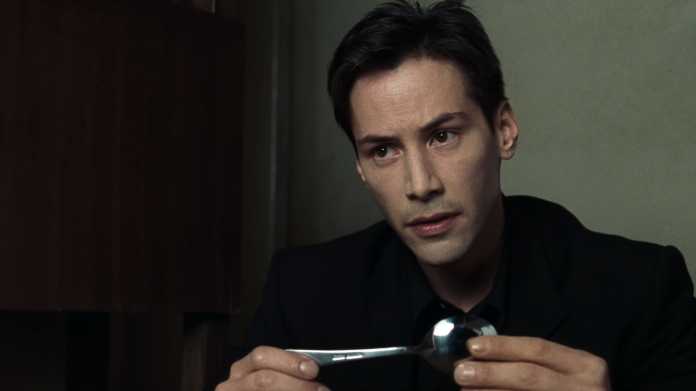25 years of "The Matrix": Celebrating the movie with the red pill
Page 3: References, allusions and interpretations
The Wachowskis made no secret of the inspirations for their story: "The Matrix" is peppered with quotes and allusions. Some are obvious, such as direct references to the Alice books by Lewis Carroll and "The Wizard of Oz". Others are more subtle, such as the aforementioned Baudrillard book. TV sets in the background show the giant rabbits attack from "Night of the Lepus" (1972) and a shot from the paranoia series "The Prisoner" (1967).
Other sequences quote visuals from Japanese anime films: The infamous lobby scene was obviously inspired by "Ghost In The Shell" (1995); the scene in the oracle's antechamber has parallels to "Akira" (1988).
The Matrix – Allusions and quotes (7 Bilder)

(Bild: Warner Bros / Village Roadshow Pictures)
Some elements of the film leave room for different interpretations: Trinity and 303 can be associated with synthesizers by Korg and Roland, but can also refer to each other. Or should the name be an allusion to the Christian Trinity, possibly represented by Morpheus, Neo and Trinity? Neo lives in apartment number 101, which could just as easily refer to the anagram "One" as to a key scene in George Orwell's novel "1984".
Fans began to speculate about these allusions shortly after the film's original release. Discussion forums offered lots of theories – some plausible, others off-kilter. The Wachowskis offered no help: To this day, they steadfastly refuse to explain their work.
At least they have explained why they don't want to explain themselves: "We discovered that whenever we explained what the films meant to us, other people became less likely to offer their own interpretation." (from the Wachowki's introduction to the DVD box set "Ultimate Matrix Collection")
The Wachowskis merely comment when misinterpretations become too prevalent. For example, it was once reported that Lilly Wachowski had claimed that the entire film was a metaphor for transsexuality. This turned out to be a poor edit in an interview. Years later, Wachowski clarified that she had merely referred to the original intention for the dual casting of the Switch role.
To this day, "The Matrix" keeps getting re-interpreted, always in the context of the current zeitgeist. The red pill – in the film, a crucial step to free one's consciousness from the machine-generated fantasy world – has become an enduring metaphor, although interpretations vary widely. Matrix fans have a lot in common with Star Wars fans, especially the combativeness.
The wide scope for interpretation frequently leads to explanations that are seldomly labeled as subjective interpretations, instead being presented as absolute certainties. Various YouTube channels deal exclusively with such Matrix "explanations". The actual videos are often less entertaining than the comments below them about why the creator is utterly wrong.
Occasionally, multiple truths exist, for example when it comes to quotations. Does Smith contemptuously state "Human beings are a disease. You're a cancer of this planet. And we are the cure" or "Human beings are a disease, a cancer of this planet. You're a plague, and we are the cure"? Both are correct: The first version is spoken from the trailer, the second quote is from the movie.